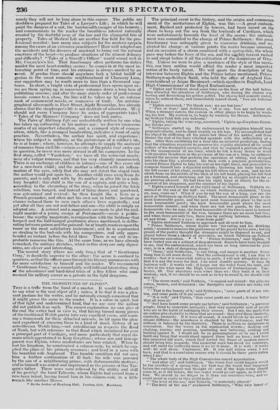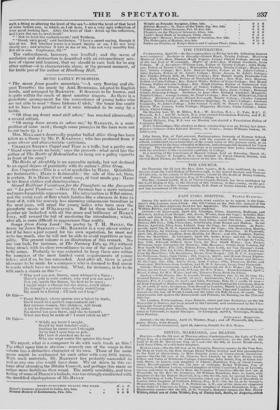THE MISFORTUNES OF ELPHIN*.
Tins is a trifle from the hand of a master. It would be difficult to say what is the real object of it ; unless it be that it was a plea- sant pastime for the writer, and he naturally enough conceived that it might prove the same to the reader. It is a satire in spirit, but of that light and undetermined kind, that we are sure the author did not publish it as such. The easiest explanation we can give of the end the writer had in view is, that having turned many pieces of the traditional Welsh poetry into very excellent verse, and want- ing a framework for these detached morsels, he hit upon the plea- sant expedient of encasing them in a kind of mock history of an antediluvian Welsh king,—not antediluvian as respects the flood of Noah, but with reference to that flood which inundated for ever a principal part of Cardigan, and more particularly that royal do- main which appertained to King Gwythno ; whose son and heir-ap- parent was Elphin, whose misfortunes are here related. When he lost his kingdom, he constructed a salmon-weir, by which he sup- plied the place of his princely revenues; and lived in a cave with his beautiful wife Angharad This humble condition did not save him a further continuation of ill luck : his wife was pursued by the son of a neighbouring prince, with dishonourable motives ; and he himself was seized and imprisoned in the prisons of this Tar- quin's father These woes were relieved by the ability and skill of his prott:g6 the bard Taliessin, whom Elphin had reared from a new-born infant, having found him in his salmon-weir, in a little aorach like another Moses.
* By the Author of Headlong Hall. London, l82. Hookhain.
The principal event in the history, and the origin and commence ment of the misfortunes of Elphin, was this :—A great embank- ment, flanked and protected by towers, had been raised on the shore to keep out the sea from the lowlands of Cardigan, which were unfortunately beneath the level of the ocean: the embank- ment was committed to the charge of Prince Seithenyn : this great functionary was unhappily given to excessive drinking, and ne- glected his charge : at various points the works became unsound, and on occasion of a storm combined with a spring-tide, the whole
gave way before the force of the sea, and the mighty torrent rushed in and swept before it all the cultivation of the dominions of GWy.
thy. Unless we were to give a specimen of the style of this narra- tive, our bare outline would afford the reader a most imperfect notion of its lively talent. We will quote the description of the interview between Elphin and the Prince before mentioned, Prince Seithenyn-ap-Seithyn Saidi, who held the office of Arglwid Gor- warcheidwad yr Argae Breninawl—which signifies in English, Lord High Commissioner of the Royal Embankment.
" Elphin and Teithrin stood some time on the floor of the hall before they attracted the attention of Seithenyn, who during the chorus was tossing and flourishing his golden goblet. The chorus had scarcely ended, when he noticed them, and immediately roared aloud, You are welcome all four.'
" Elphin answered, We thank you : we are but two.'
" "fwo or four,' said Seithenyn, all is one. You are welcome all. When a stranger enters, the custom in other places is to begin by wash- ing his feet. My custom is, to begin by washing his throat. Seithenyn. ap-Seithyn Saidi bids you welcome.' " Elphin, taking the wine-cup, answered, Elphin-ap-Gwythno Garen- hir thanks you.'
" Seithenyn started up. He endeavoured to straighten himself into perpendicularity, and to stand steadily on his legs. He accomplished half his object by stiffening all his joints but those of his ankles, and from thence the rest of his body vibrated upwards with the inflexibility of a bar. After thus oscillating for a time like an inverted pendulum, finding that the attention requisite to preserve his rigidity absorbed all he could collect of his dissipated energies, and that he required a portion of them for the management of his voice, which he felt a dizzy desire to wield with peculiar steadiness in the.presence of the son of a king, he suddenly relaxed the muscles that perform the operation of sitting, and dropped into his chair like a plummet. He then with a gracious gesticulation, invited Prince Elphin to take his seat on his right hand, and proceeded to compose himself into a dignified attitude ; throwing his body back into the left corner of his chair, resting his left elbow on its arm, and his left cheek-bone on the middle of the back of his left hand, placing his left foot on a footstool, and stretching out his right leg as straight and as far as his position allowed. He had thus his right hand at liberty for the or- nament of his eloquence, and the conduct of his liquor. " Elphin seated himself at the right hand of Seithenyn. Teithrin re- mained at the end of the hall : on which Seithenyn exclaimed, Come on, man, come on ! What if you be not the son of a king, you are the guest of Seithenyn-ap-Seithyn Saidi. The most honourable place to the most honourable guest, and the next most honourable place to the next most honourable guest ; the least honourable guest above the most honourable inmate ; and when there are but two guests, be the most honourable who he may, the least honourable of the two is next in honour to the most honourable of the two, because there are no more but two; and when there are only two, there can be nothing between. Therefore sit and drink. Gwier o Eva: wine from gold.' "Elphin. motioned Teithrin to approach and sit next to him. "Prince Seithenyn, whose liquor was 'his eating and his drinking solely,' seemed to measure the gastronomy of his guests by his own ; but his groom of the pantry thought the strangers might be disposed to eat, and Placed before them a choice of provision, on which Teithrin-ap-Tathral did vigorous execution. * * Prince Seithenyn,' said Elphin, 'I have visited you on a subject of deep moment. Reports have been brought to me, that the embankment, which has been so long intrusted to your care, is in a state of dangerous decay.' "'Decay,' said Seithenyn, is one thing, and danger is another. Every thing that is old must decay. That the embankment is old, I am free to confess : that it is somewhat rotten in parts, I will not altogether deny : that it is any the worse for that, I do most sturdily gainsay. It does its business well : it works well it keeps out the water from the land, and it lets in the wine upon the High Commission of Embankment. Cup- bearer, fill. Our ancestors were wiser than we : they built it in their wisdom; and, if we should be so rash as to try to mend it, we should only mar it.'
" 'The stone-work,' said Teithrin, 'is sapped and mined; the piles are rotten, broken, and dislocated the floodgates and sluices are leaky and creaky.'
" That is the beauty of it,' said Seithenyn ; some parts of it are rot- ten, and some parts of it are sound.' " 'It is well,' said Elphin, that some parts are sound ; it were better that all were so.'
"'So I have heard some people say before,' said Seithenyn ; a perverse people, blind to venerable antiquity ; that very unamiable sort of people who are in the habit of indulging their reason. But I say, the parts that are rotten give elasticity to those that are sound : they give them elasticity, elasticity, elasticity. If it were all sound, it would break by its own ob- stinate stiffness : the soundness is checked by the rottenness, and the stiffness is balanced by the elasticity. There is nothing so dangerous as innovation. See the waves in the equinoctial storms ; dashing and clashing, roaring and pouring, spattering and battering, rattling and battling against it. I would not be so presumptuous as to say I could build any thing that would stand against them half an hour ; and here this immortal old work, which God forbid the finger of modern mason should bring into jeopardy, this immortal work has stood for centuries, and will stand for centuries more if we let it alone. It is well : it works well : let well alone. Cupbearer, fill. It was half rotten when I was born, and that is a conclusive reason why it should be three parts rotten when I die.'
"The whole body of the High Commission roared approbation. "'And after all,' said Seithenyn, the worst that could happen would be the overflow of a spring-tide, for that was the worst that happened before the embankment was thought of : and if the high-water should come in, as it did before, the low-water would go out again, as it did be- fore. We should be no deeper in it than our ancestors were, and we could mend as easily as they could make.'
" The level of the sea,' said Teithrin, is materially altered.' "'The level of the sea 1' exclaimed Seithenyn, 'Who ever heard ef
such a thing as altering the level of the sea ?-Alter the level of that bowl of wine before you, in which, as I sit here, I see a very ugly reflection of your good-looking face. Alter the level of that : drink up the reflection, and leave the sea to level itself.'
" Not to level the embankment,' said Teithrin.
Good, very good,' said Seithenyn. I love a smart saying, though it hits at me. But whether yours is a smart saying or no, I do not very clearly see ; and whether it hits at me or no, I do not very sensibly feel. But all is one. Cupbearer, fill.'"
The embankment, however, was levelled ; and the scene of confusion and destruction is described with an extraordinary mix- ture of vigour and humour, that we should in vain look for in any other author-it is characteristic alone, at the present moment, of the facile pen of the author of Headlong Hall.



















 Previous page
Previous page